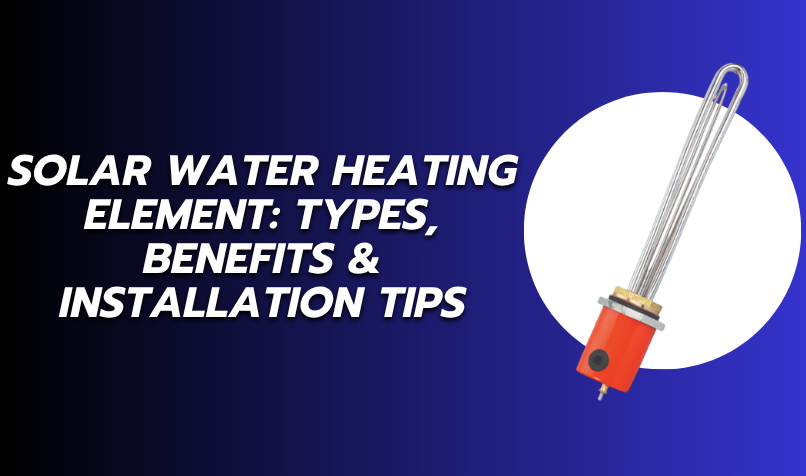
Looking for a sustainable way to get hot water throughout the year? A solar water heater with a reliable heating element is the perfect solution. Whether you’re a homeowner, installer, or industrial user, understanding the different types of solar water heating elements, their benefits, and expert-backed installation tips can help you make an informed decision and ensure long-term efficiency.
A solar water heating element is an electric component installed inside the storage tank of a solar water heater. It serves as a backup heating system when sunlight is insufficient, such as during cloudy days, the winter season, or in high-demand situations. These elements are commonly found in both domestic and industrial solar water heaters.
They are made from materials such as copper, incoloy, titanium, or glass-coated metals, and are designed to handle varying water qualities, temperatures, and pressure conditions. The electric backup in solar water heaters ensures consistent hot water availability regardless of climate fluctuations.
A solar water heater for home or commercial use primarily uses solar collectors to absorb sunlight and convert it into heat, which warms the water in the storage tank. However, during periods of low sunlight, the electric heating element steps in to maintain a constant hot water supply.
This hybrid system combines solar and electrical energy, offering both energy savings and reliability — ideal for diverse water conditions and Indian weather patterns.
Choosing the best heating element for your solar geyser depends on factors like water hardness, usage capacity, and your budget. Here’s a breakdown:
By supplementing solar energy, heating elements reduce your dependency on grid electricity or gas, leading to up to 70% savings on water heating costs annually.
(Source: MNRE India, average savings for solar-assisted systems)
A solar heating system significantly reduces greenhouse gas emissions and aligns with India’s clean energy goals.
Even during monsoon or winter, the electric backup in solar water heaters ensures you always have hot water when you need it.
Using a corrosion-resistant heating element, such as incoloy or titanium, extends the lifespan of your water heating system.
High-quality components from trusted manufacturers are built for long-term performance, often requiring minimal maintenance.
Proper installation is critical to ensure safety, energy efficiency, and product longevity. Here are expert recommendations:
The solar heating element price in India varies based on the material (copper, incoloy, titanium), wattage, and voltage rating. While copper elements may start around ₹300, titanium or glass-coated variants can range between ₹800–₹2000. For bulk or custom requirements, contacting a trusted manufacturer is recommended.
Powerpack Electricals is a trusted name in the field of industrial and residential heating components in India. With years of experience, we manufacture solar-compatible heating elements that are:
Our Key Features:
Whether you're retrofitting an existing system or installing a new one, Powerpack Electricals offers the expertise and product range you need.
Contact us today for pricing, technical consultation, or to place a bulk order.
The lifespan varies by material and water quality. On average:
No. Solar-compatible elements are designed for temperature and pressure fluctuations typical in solar systems. Always use elements made for solar heaters.
Titanium or glass-coated heating elements are the most reliable and durable for hard or saline water conditions.